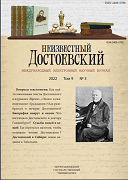Задачи атрибуции анонимных статей в изданиях Достоевского
Problems of Attribution of Anonymous Articles in Dostoevsky’s Publications
Author(s): Vladimir Nikolaevich ZakharovSubject(s): Russian Literature, 19th Century, Sociology of Literature
Published by: Петрозаводский государственный университет
Keywords: Dostoevsky; journalism; editing; Vremya; Epokha; Grazhdanin; attribution; sources; document; criticism; polemic; statistical methods; digital textual criticism;
Summary/Abstract: A large volume of anonymous articles that may have been written by Dostoevsky was published in the “Vremya” and “Epokha” journals, and in the weekly “Grazhdanin.” Their significance is great: in feuilletons, criticism and polemical articles, the writer developed a new ideological direction -“pochvennichestvo.” Over the past fifty years, the corpus of texts that are attributed to Dostoevsky with confidence has significantly expanded. Extensive trial and error experience has been accumulated in their attribution, which allows to pose and solve a number of methodological problems. An almost indisputable criterion of belonging is the author’s literary signature, however, in journalistic practice, the signed text is not always composed by the person who signed it - sometimes the authorship belongs to the editor or editorial staff. Dostoevsky himself published a number of his articles under the name of M. M. Dostoevsky, “the family of M. M. Dostoevsky,” A. U. Poretsky, V. P. Meshchersky. Anonymity was a condition for the publication of numerous articles. The editors bought the text, adapted it to the journal’s vector, corrected the beginning and ending, made inserts and notes, the editor often rewrote someone else’s text, sometimes worked on compilations. Currently, a new stage of discussion of attribution problems has begun. Previously unpublished sources have been introduced into scientific circulation - in particular, handwritten income-expense and fee books of the 1860s-1865s, which were initially kept by M. M. Dostoevsky, and then by F. M. Dostoevsky. Their study expands the researchers’ arguments. The use of mathematical methods is of great importance in determining authorship. Most of the existing mathematical attribution techniques are untenable; first and foremost, they do not even convince mathematicians themselves. There are proven methods that allow to substantiate with a high degree of persuasiveness the authorship and co-authorship of Dostoevsky in writing anonymous and pseudonymous articles, and to reveal his editing of other authors’ texts. Further improvement of statistical methods in determining authorship is required.
Journal: Неизвестный Достоевский
- Issue Year: 9/2022
- Issue No: 3
- Page Range: 5-24
- Page Count: 20
- Language: Russian

